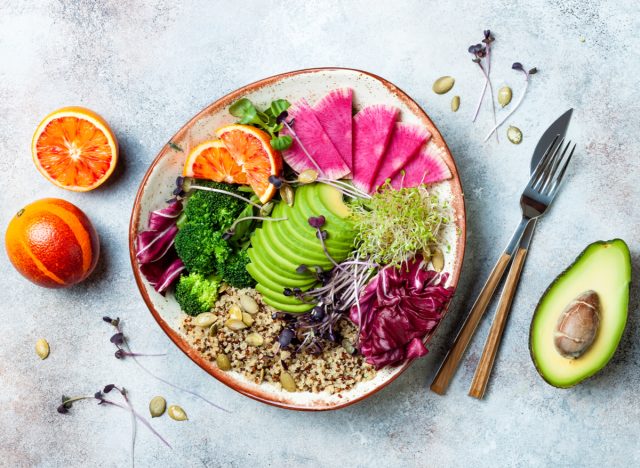4 Worst Eating Habits If You Have Arthritis, Say Dietitians

Depending on the severity of your condition, arthritis symptoms can range from being mildly frustrating to excruciatingly painful. Unfortunately, it’s also quite common. In fact, 24% of adults in the United States have arthritis, according to the Centers for Disease Control and Prevention (CDC).
While there is no known cure for arthritis, there are several foods that have been found to help alleviate joint pain, swelling, and stiffness. On the other hand, there are also several foods to avoid. To learn more, we asked a couple of dietitians to give us a rundown of the eating habits that are known to trigger or exacerbate arthritis symptoms. Then, for more health tips, check out The #1 Best Juice to Drink Every Day, Says Science.
Eating too much added sugar

It would be an understatement to say that added sugar isn’t doing any favors for your health. And when it comes to arthritis, this can wreak additional havoc on your body.
“One of the worst habits is to eat a diet that is rich in added sugars, like enjoying too many sweets, sugary beverages, or other choices that are high in sugar and low in beneficial nutrients,” says medical expert board member Julie Upton, MS, RD, CSSD. “The reason why this is so bad for arthritis is that sugar triggers inflammation in the body and arthritis is exacerbated by systemic inflammation.”
While baked goods, sweetened drinks, and candy are the usual culprits, there are several unsuspecting sources of sugar found in a wide scope of processed foods—many of which are often mistaken for being healthy.
Not eating enough plants

With colorful candies being ill-advised, here’s how you can taste the rainbow in a healthy way: by eating more plants. This includes fruits, vegetables, legumes, nuts, and seeds, which have been shown to have anti-inflammatory effects.
“These foods help to tamper out inflammation, as they are rich in antioxidants and fiber, which can help to promote healthy bacteria in the gut,” says Amy Shapiro, MS, RD, another member of our medical expert board. “Studies have shown [that] individuals with arthritis tend to have limited diversity in gut bacteria.”
Looking to give your gut a boost? Check out the Popular Foods That Improve Your Gut Health, Says Science.
Eating a high-sodium diet

While salt may be an effective flavor enhancer, regularly eating foods with a high sodium content can lead to several health issues, arthritis aside. This can range from headaches and bloating to high blood pressure and an increased risk of heart disease.
However, when it comes to arthritis, salt can cause cells to draw in water, which could ultimately worsen symptoms like swelling. Additionally, corticosteroids, which are commonly used to treat rheumatoid arthritis, can cause the body to retain more sodium, according to The Arthritis Foundation.
To navigate the salt scene, Shapiro recommends reading nutrition labels and choosing foods with less than 20% of your daily value of sodium. If you’re in an environment where labels aren’t accessible or you’re dining out, she says to limit fried foods and ask for salad dressings and sauces on the side.
Consuming too much saturated fat

While research has shown that saturated fat triggers inflammation in adipose (fat tissue), studies have also found that it can weaken cartilage in the joints.
“Try to limit or avoid foods rich in saturated fat, which are primarily animal-based, high-fat foods like red meat, butter, full-fat cheese, and other full-fat dairy products,” Upton says.
For more, check out Drinking Habits You Must Follow If You Have Arthritis, Say Dietitians.









